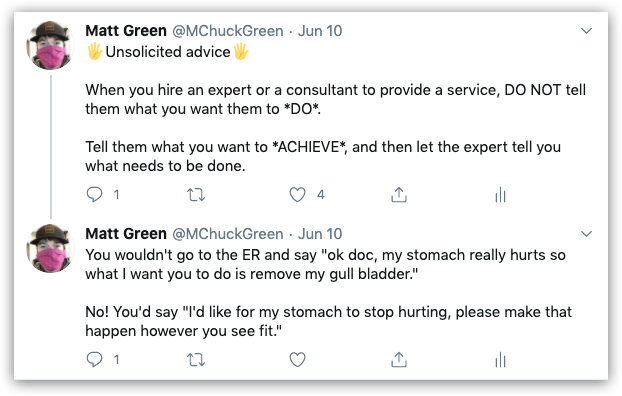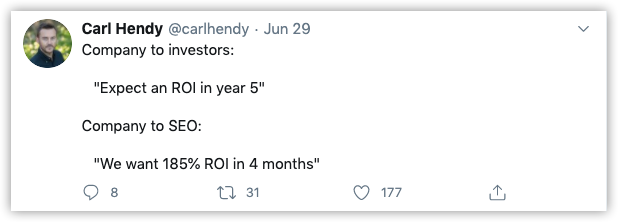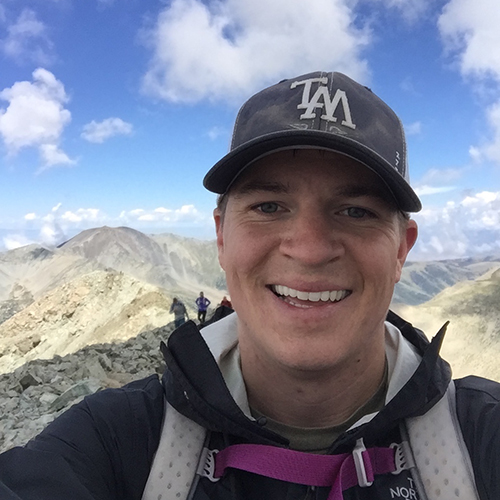If you’re in the process of hiring a law firm SEO agency, or you work directly with an SEO provider that your law firm is currently engaged with, this post is for you.
It’s 2020 and most law firms need not be convinced of the value of search engine optimization (SEO). That is to say, most divorce lawyers understand the value of showing up on Google’s first page of results when someone in their city searches “divorce lawyer.”
Nevertheless, law firms tend to be really bad at hiring and working with SEO agencies effectively, as is evidenced by significant churn in the legal SEO space. At my company, Juris Digital, a full 70% of our current clients came to us after leaving one or more previous legal SEO agencies.
While you may be tempted to blame this huge level of churn on shoddy SEO providers (and there are more than a few), I have come to find that law firms frequently get crucial things wrong when they invest in SEO, whether it be their choice of provider, their expectations, their workflow, or their process for closing new leads that SEO generates.
These mistakes lead to frustration, churn, and most importantly, a poor return on their SEO investment.
For this post, I’ve drawn on my 10 years of experience winning SEO business, losing SEO business, and succeeding and failing at executing effective law firm SEO campaigns, to help you hire the right SEO provider, and get out of the way of your own success once you do.
How to Avoid Losing Money on Your SEO Investment
- Hire a legal SEO agency that doesn’t suck.
- Don’t tell your SEO agency what you want them to do; tell them what you want to achieve.
- Treat your SEO provider like a partner, not a vendor.
- Have a system for effectively responding to and signing up new leads.
- Understand that your SEO investment should be made from a position of stability, and your expectations shouldn’t be insane.
- Before firing your current SEO provider and hiring a new one, escalate your concerns.
- Know that you don’t have to spend the same amount on SEO forever.
Hire a legal SEO agency that doesn’t suck
While I was drafting this post I really wanted to skip over this point, because “no sh*t,” but it’s crucial so I had to keep it in.
Here’s a secret: There are a lot of good SEO companies out there who are capable of succeeding for your law firm. One of the central arguments I am submitting here is that, more often than not, a law firm can ensure the success of their SEO investment by avoiding crucial mistakes, regardless of what agency they hire.
Then again, there are some law firm SEO agencies out there that just aren’t capable of getting the job done. To weed them out, look for the following in the legal SEO companies you interview:
- They can clearly articulate what SEO success will look like for your law firm
- They can clearly articulate how they actually generate that success, without using words like “ninja” or “secret sauce” or “juice”
- They take a consultative approach to selling rather than trying to cram you into a one-size-fits-all campaign
- They can provide multiple happy-client references
- They can point you to real-world examples of their work, and you are impressed by the quality
- Their website is of a high quality and ranks well in search engines for relevant keywords
- They have more than a few positive online reviews
- Their prices and promises aren’t too good to be true
This checklist will help you know whether a given SEO agency is up to the task of succeeding for your law firm. However, it won’t help you actually identify quality lawyer SEO agencies to consider.
The best way to find a good SEO company for your firm is the same as the best way to hire an attorney; get a personal referral from someone you know who works with an SEO agency that they’re happy with.
If that’s not an option, use the second best option (hopefully, the option your potential new clients will soon be finding you): Google it. Once you find a few strong candidates, speak and get proposals from them, and then compare your experience with each against the checklist above.
Don’t tell your SEO agency what you want them to do; tell them what you want to achieve.

[ Source ]
Lots of attorneys know just enough about SEO “to be dangerous.” One of the biggest red flags for me is when a potential new SEO client reaches out and tells me what specific SEO work they want me to do. For example:
I want you to build 20 EDU links
I want you to write 30 practice area pages
I want you to build 100 local citations
I want you to optimize my page titles
I want you to write 5 blogs per month
When I go to the dentist, I don’t tell her to do a root canal. I tell her that my tooth freaking hurts, and that I’d like it to stop hurting. Because I’m not a dentist and she is.
I am quite sure that most DUI attorneys wouldn’t be thrilled if a client dictated to them the specifics of what their defense strategy ought to be.
As you work with an SEO partner for your law firm you should get in the habit of communicating what outcome you’d like to achieve rather than attempting to dictate the strategy and tactics for getting there. For example, here are some great goals to communicate with your legal SEO provider:
I want more divorce cases involving business owners
I want more business litigation matters involving shareholder disputes
I want to improve my website’s conversion rate on mobile devices
I want to bring in leads from a new geographic market
Now, this is not to say that there is no room for collaboration with your law firm SEO provider; there is!
If you’re a personal injury lawyer, you know that your client has information that can help tremendously in presenting a compelling argument for damages. You know that open communication and information sharing between you and your client is essential. But you also know that you don’t need them to dictate the specifics of the demand letter or the prose in your closing argument.
The situation is no different with your SEO provider. Tell them what you want to achieve. Explain the problems you are having. Give them insight into the operations of your law firm and the most common issues faced by your clients. But for goodness sake, don’t tell them what changes they should make to your website’s URL structure.
Treat your SEO provider like a partner, not a vendor
When you hire an SEO company to work with your law firm, you are asking them to do something that’s really not easy: To create, as if from thin air, new lucrative business opportunities for your firm.
As with anything that’s valuable, achieving this will require motivated human beings who care deeply about your goals. In my experience, the dumbest thing attorneys can do when they hire an SEO provider is to establish a patronage relationship.
I realize this is hard for many law firms to accept. After all, technically, it is a patronage relationship. The law firm pays the SEO provider for a service. It is reasonable to feel that simply by way of handing over your money that your SEO provider owes you their best efforts towards your goals, and I would agree.
But the goal here isn’t to beat your SEO into submission by pointing to the last check you cut. No. The goal is to get the most out of them. And how do you get the most out of humans? By forming a relationship in which client and provider are equal partners in a shared endeavor.
I can say from personal experience that I have always done my best work for clients who are effective at making me feel like I am a part of their team, not just a worker bee from whom they expect a certain amount of output. So how do you achieve this in practice? It’s not so difficult:
- Treat your SEO provider with respect, the same way your legal clients treat you.
- Make an effort to establish a communication style that places you and your SEO on an even playing field, rather than in a hierarchy.
- Trust that your SEO has your best interests at heart rather than assuming the worst in their intentions.
- Constructive criticism is fine, but always acknowledge a job well done. I, for one, will move mountains for the client who makes me feel that my work is appreciated.
The key here is that while it may be satisfying to treat your law firm’s SEO provider like an untrustworthy teenager, it’s not effective if your goal is to get the best possible SEO results.
Have a system for effectively responding to and signing up new leads
Whether your SEO investment yields 10 leads a year, 10 leads a month, or 10 leads a day, it won’t make a lick of difference if you don’t have an effective system for turning those leads into clients.
I have seen this time and again over the course of my career. The conversations with my clients go like this:
Me: The data is looking good. We’re 6 months into the campaign and we’re ranking well for our target keywords, we’re getting traffic from those keywords, and we see that folks are calling you or filling out a form once they get to the site.
Client: Yeah, we’re not signing up any new cases.
Me: How long does it take you to respond when a lead comes in?
Client: I don’t know, normally the same day, sometimes the next day, unless it comes over the weekend, then we respond early in the week.
Me: What if someone calls after hours? Is anyone taking those calls?
Client: People call us after hours?
Me:

If you’re not able to respond to SEO-generated leads quickly – within minutes – and you are not able to convert qualified leads into new clients at a high rate, your SEO investment will fail.
I’m not going to get into all of the strategies and tactics you can use to increase close rate; that’s it’s own post. What I can say is that before you invest in SEO for you law firm you need to have solutions for the following:
- Ability to answer phone calls – and provide an above average customer experience – 24/7.
- Ability to respond to inquiries from the web within minutes. I am talking 5 minutes or less.
- Some sort of technology or system that enables you to organize and manage your web leads and follow up with them as appropriate.
- Ability to close. You need to be able to convince prospective clients that you are the right attorney for them and close new clients at a high rate.
If you are not able to sign up a large percentage of the qualified leads that your investment in SEO produces, you’ll never see a positive return.
Understand that your SEO investment should be made from a position of stability, and your expectations shouldn’t be insane
Anyone reading this who’s hired an SEO agency before knows one of our favorite things to say:
“SEO is a long term investment. It’s a marathon, not a sprint.”
At this point it’s a cliche, but it’s true. If you need to generate revenue immediately in order for your firm to stay afloat, you are in no position to be investing in SEO.
You wouldn’t believe how many attorneys think that it is perfectly reasonable to expect to double their revenue within 6 months by paying an SEO agency the same amount as they would data entry intern.
This tweet sums up that position pretty well:

Every now and then an attorney will reach out to us expressing concern that if they don’t start bringing in more new business soon, they will not make it.
100 times out of 100, we turn these leads away. Sure, we could take their money and hope for the best, but we know that, generally, an investment in SEO takes 12 to 18 months to mature to a point where the firm is able to sign consistent new business from the web, and begin to realize a return on their investment.
Not only is your investment in SEO likely to fail if you make said investment from a position of desperation because of the fact that SEO takes time to bear fruit, it will also place undue stress on the human beings who are actually working on your campaign, which will lead to subpar work and results.
(True story: Early in my career, I had a client tell me that if I didn’t get his website back to page one of Google for a certain keyword in the next week, he wouldn’t be able to pay his mortgage and his wife would leave him. Not cool.)
Before firing your current SEO provider and hiring a new one, escalate your concerns
It is expensive to switch SEO companies. Not only does it require your time and energy researching and vetting new SEO companies, but when a new company takes over they will likely charge you a large up front fee which essentially covers the time they need to formulate a strategy and learn a whole bunch of things about your firm and your market that your current SEO provider already knows.
Before you fire your current law firm SEO provider, you should escalate your concerns, and communicate clearly your issues and your expectations.
As someone who runs an SEO agency for attorneys, I can tell you that sometimes the wrong people are assigned to a project. Whether it’s that they don’t have the right skill set or experience for the client, or that they just have incompatible personalities or styles, mismatches happen.
But the good news is that, if you’re with a reputable law firm SEO provider, they almost certainly have other folks on their team who can take over your project and help bring things up to your standards and expectations.
I’m not just saying this because clients have fired me too quickly and I’m sad about it (though that has happened). I’ve also taken on new clients who I felt fired their previous SEO provider too quickly! While there is certainly a time to move on, it’s in your best interest to exhaust your options with your current legal SEO provider before taking on the time and costs involved with jumping ship.
Know that you don’t have to spend the same amount on SEO forever
This is something very few of the law firm SEO agencies you speak with will admit: You don’t have to invest the same high amount on SEO continually and indefinitely.
Unlike “pay-to-play” methods of online online advertising, the benefits from an investment in SEO don’t vanish when you stop spending money.
The truth is, competent execution of a strategic SEO campaign over the course of 12, 18, or 24 months (depending on where you are starting from) can continue to bear fruit for years after you stop investing in SEO.
At my company (Juris Digital) we’ve invested a lot into our own SEO over the years. That is to say, we’ve researched and optimized for topics that our potential clients are searching on, we’ve written a lot of quality content on those topics, we’ve built links to that content, and we’ve updated it periodically as needed.
However, we don’t “do SEO” at that same rate at all times. We often go long stretches where the nature of our business challenges or workload means that we spend less time and energy on our own SEO. Might our site be even more valuable as a lead generator if we constantly invested in SEO at the same rate? Sure.
But the point is, because of the nature of SEO, we have the freedom to shift our resources to other areas when it makes sense, without having to fear that our previous SEO investment will be wasted.
After you’ve invested in SEO for a period of time, and you are seeing strong results, ask your SEO provider something like, what should I expect to happen if I cut my SEO investment in half for the next 12 months? If they tell you that all the gains you’ve made will be lost, they are probably lying to you.
Cutting back your spend on SEO is a far better option than firing your SEO agency altogether, and a reputable SEO provider will help work with you to determine a scope of services that will both maintain your SEO results, and help you shift resources elsewhere, if that’s what’s best for your business.
Too long; didn’t read
I run an SEO agency for lawyers. A full 70% of our clients come to us after feeling like their previous SEO provider failed them.
While there are plenty of not-good legal SEO providers, law firms often get in the way of their own success by making key mistakes in how they work with their chosen SEO agency. By avoiding these mistakes, law firms can realize a strong return on their SEO investment, and avoid the frustration and expense that goes along with frequently firing and hiring SEO companies.
 Matt Green is the COO at Juris Digital, a full service digital marketing agency for law firms. Matt is passionate about facilitating more and better case opportunities for lawyers by helping them unleash the content marketing power of their own subject matter expertise. Want to talk about SEO for your law firm?
Matt Green is the COO at Juris Digital, a full service digital marketing agency for law firms. Matt is passionate about facilitating more and better case opportunities for lawyers by helping them unleash the content marketing power of their own subject matter expertise. Want to talk about SEO for your law firm?
Get in touch with Matt here: Email | LinkedIn
 Staci Zaretsky is a senior editor at Above the Law, where she’s worked since 2011. She’d love to hear from you, so please feel free to email her with any tips, questions, comments, or critiques. You can follow her on Twitter or connect with her on LinkedIn.
Staci Zaretsky is a senior editor at Above the Law, where she’s worked since 2011. She’d love to hear from you, so please feel free to email her with any tips, questions, comments, or critiques. You can follow her on Twitter or connect with her on LinkedIn.


 Ellen Trachman is the Managing Attorney of
Ellen Trachman is the Managing Attorney of 
 Jordan Rothman is a partner of
Jordan Rothman is a partner of 








